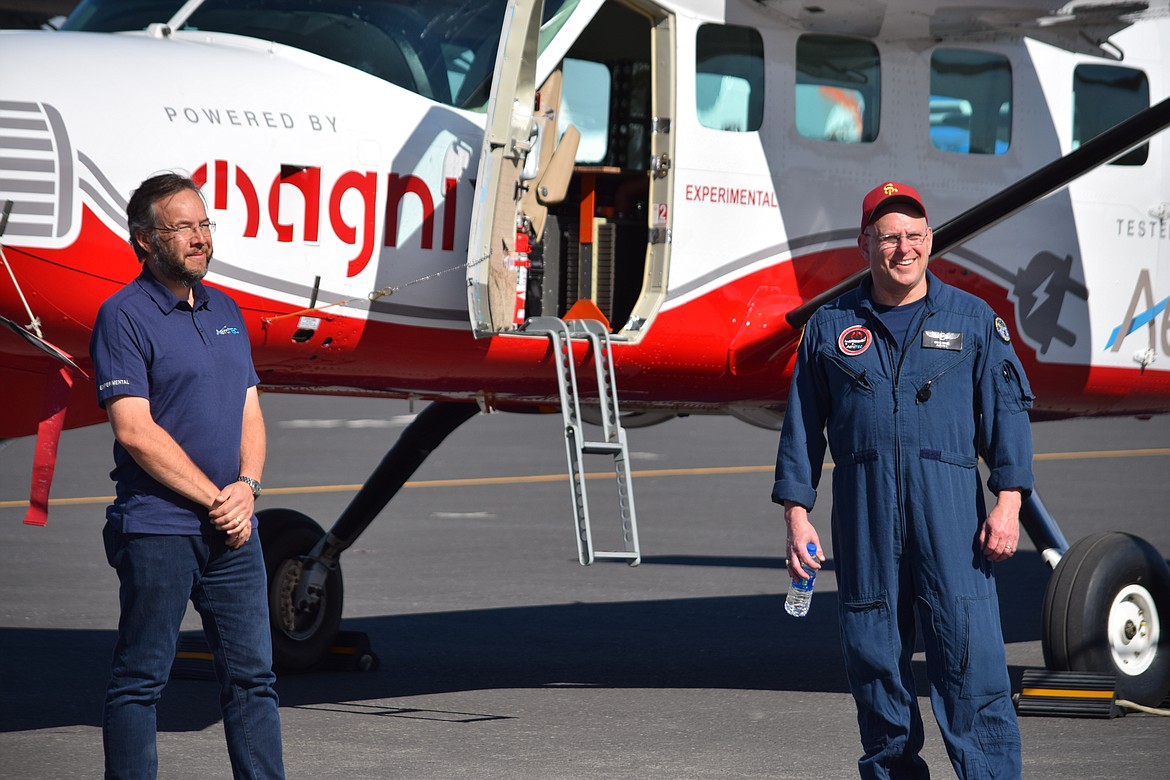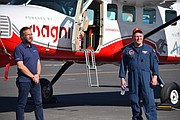Electric plane takes flight in aviation first
MOSES LAKE — A little history was made in Moses Lake when an AeroTEC Cessna Caravan, powered entirely by batteries, took off, flew for 30 minutes and landed successfully at Grant County International Airport on Thursday.
“This was fantastic,” said Roei Ganzarski, CEO of MagniX, the company building the electric motors that powered the modified test plane. “It was uneventful, as a flight should be, but it was really tremendous.”
“Electric aviation is the future,” said AeroTEC President Lee Human. “There’s been a lot of sweat and late nights on this, but clearly this is the best place to do this kind of work.”
Redmond-based MagniX (pronounced mag-nee-eks) is working with AeroTEC to both test its electric motors and get them certified by the Federal Aviation Administration. MagniX has been contracted by Israel-based Eviation to provide the motors for its proposed commuter plane named Alice.
In addition, MagniX is working with British Columbia-based Harbor Air, a charter and tour air carrier, and has converted one of the company’s De Havilland Beaver floatplanes to run on batteries for a series of test flights, Ganzarski said.
At the Paris Airshow in July 2019, Eviation CEO Omer Bar-Yohay announced that his company was partnering with AeroTEC to test and certify the Alice and its components in Moses Lake, with an eye toward certifying the aircraft in 2021. Design work on the Alice continues, however, and a prototype was damaged in an electrical fire in late January at Eviation’s facility in Prescott, Arizona.
However, MagniX and AeroTEC continue to work on the company’s electric aircraft motors, and the Thursday test — which saw the modified Caravan fly increasingly wider and higher loops over the GCIA for half an hour — demonstrated the feasibility of battery-powered aircraft.
“This is real technology, it’s here today, it performs admirably,” Human said.
AeroTEC specializes in testing and certifying aircraft and components, and has its testing operations based in Moses Lake because the weather is optimal for flight tests and the GCIA is one of the largest airports in the country without regularly scheduled air service, meaning the airspace “is uncomplicated,” Human said.
AeroTEC has hosted much of Mitsubishi Aircraft’s SpaceJet testing program and is currently modifying an old Qantas 747 for Rolls Royce to test new engine technology. AeroTEC has two large aircraft hangars at GCIA and is building a third.
AeroTEC Chief Test Pilot Steve Crane said the flight test showed the plane handled as well as its designers expected.
“It flew great,” he said. “There was almost instant response, and the motor was very quiet and very responsive.”
Ganzarski said even with current battery technology limiting an electric aircraft’s range to around 100 miles, he still believes there is a market right now for small, battery-powered planes to make short passenger and cargo trips, and even plans to offer to convert Cessna Caravans to electric power.
And as battery technology improves, so will an aircraft’s range, Ganzarski said.
He also said an all-electric aircraft would be 40-80 percent cheaper to fly, given that the electric motors have far fewer moving parts and would need much less maintenance than current aircraft engines.
“Electric motors are very simple,” he said.
With the fast chargers MagniX currently has, Ganzarski said it would take several hours to fully charge the Cessna’s batteries for flight.
Because of the expected lower operating costs, Human said he envisions a renaissance of commuter aviation, since those lower costs would make it possible to economically fly 20 people to and from places like Moses Lake on a regular basis. The smallest passenger planes anymore carry 70-100 people, Human said, and it’s just not feasible to fly into or out of GCIA in planes that big.
“You can’t sell 70 seats to Portland from Moses Lake, but you can sell 20,” he said. “This is a big deal. What we did today is truly revolutionary.”
Several more flight tests of the modified Caravan are planned, Crane said, and after that, both AeroTEC and MagniX will re-evaluate the program and see where they go from there.
Out on the airfield, a group of MagniX and AeroTEC employees and their family members, as well as a few local dignitaries and officials, gathered to watch the test.
“It’s pretty awesome,” said Rep. Tom Dent, R-Moses Lake, during the flight test. “This is new technology, and I think that’s always good, no matter how it turns out.”
Port of Moses Lake Commissioner Darrin Jackson was also enthusiastic about the test.
“It’s a good day for the Basin, a good day for AeroTEC, and a good day for the port,” he said.
Charles H. Featherstone can be reached at [email protected].



